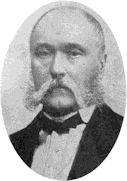Franz Thomé
Franz Thomé (born November 21, 1807 in Vienna , † May 22, 1872 in Prague ) was an Austrian theater director and actor.
Life
Franz Thomé was the son of an official of the Russian ambassador in Vienna, Prince Andrei Kirillowitsch Rasumowski . After his father's death, his mother moved with him to Dresden , where he graduated from high school. When his mother remarried, the family moved back to Vienna, where he began a theater career at the age of 17. He had his first engagements in Vienna , Mainz and Paris , where the society to which he belonged failed financially. From 1837 on, Thomé played first in Pest and then in Nuremberg . Shortly afterwards he took over the management of the theater in Ljubljana , which at the time was connected to that of Trieste . In 1847 he was engaged by Count Skarbek in Lemberg's newly built theater as "artistic director" , but in 1848 he returned to the combined stages of Laibach, Trieste and Klagenfurt . In 1850 he took over the management of the country theater in Graz . A common saying of the time - based on the excellent stage design he sponsored - was:
- "You have to hear the 'Prophet' in Vienna and see it in Gratz."
From March 22, 1853 to 1858 he was director of the Riga theater . From 1859 he led the Prague Estates Theater - initially together with Johann August Stöger . When he fell out with him in 1860 due to financial discrepancies, he continued to run the theater alone until 1864. Some well-known actors, such as the later Viennese actor Konrad Adolf Hallenstein and the singers Franz Innozenz Nachbaur and Eduard Bachmann , he brought into his ensemble. After a short break, he ran this theater again from 1865 to 1866, until it was closed by the Prussian invasion . One of Thomé's founding was the Neustädter Theater, which he built at his own expense, and from 1868 he also directed the Linz stage .
In 1870 Thomé suffered a stroke, canceled his contract in Linz and returned to Prague, where he died in 1872 after a second stroke.
He was married twice, from 1837 (in Pest) to the local singer and chorister Dlle. Baumgärtner and after moving to Prague with the singer Dlle. Günther; from this second marriage he had a daughter.
On October 10, 1859, Franz Thomé founded the Schlaraffia artists' and social club in Prague together with some of his actors and singers .
literature
- Constantin von Wurzbach : Thomé, Franz . In: Biographisches Lexikon des Kaiserthums Oesterreich . 44th part. Kaiserlich-Königliche Hof- und Staatsdruckerei, Vienna 1882, pp. 256–258 ( digitized version ). (Date of death May 23rd)
- Archduke Rudolf: The Austro-Hungarian Monarchy in Words and Pictures , 1896, p. 177 (the so-called Kronprinzenwerk )
- Markéta Bartos Tautrmanová: An arena of German-Czech culture. LIT Verlag, Münster 2012, ISBN 978-3-643-11715-1 , pp. 226 – ff. ( limited preview in Google Book search)
Web links
- Short biography in the artistic estate directory (date of death May 22nd)
Individual evidence
- ↑ Der Spiegel, for art, elegance and fashion. 18, 1845, pp. 725-726. (on-line)
- ↑ meaning the opera Le prophète by Giacomo Meyerbeer
- ↑ Dlle. is the abbreviation for Demoiselle (= Fräulein), the name used to describe the unmarried women of an ensemble; the married actresses were titled Mad. (Madame)
| personal data | |
|---|---|
| SURNAME | Thomé, Franz |
| BRIEF DESCRIPTION | Austrian theater director and actor |
| DATE OF BIRTH | November 21, 1807 |
| PLACE OF BIRTH | Vienna |
| DATE OF DEATH | May 22, 1872 |
| Place of death | Prague |
